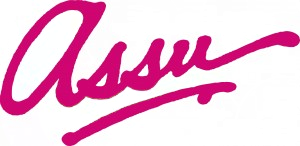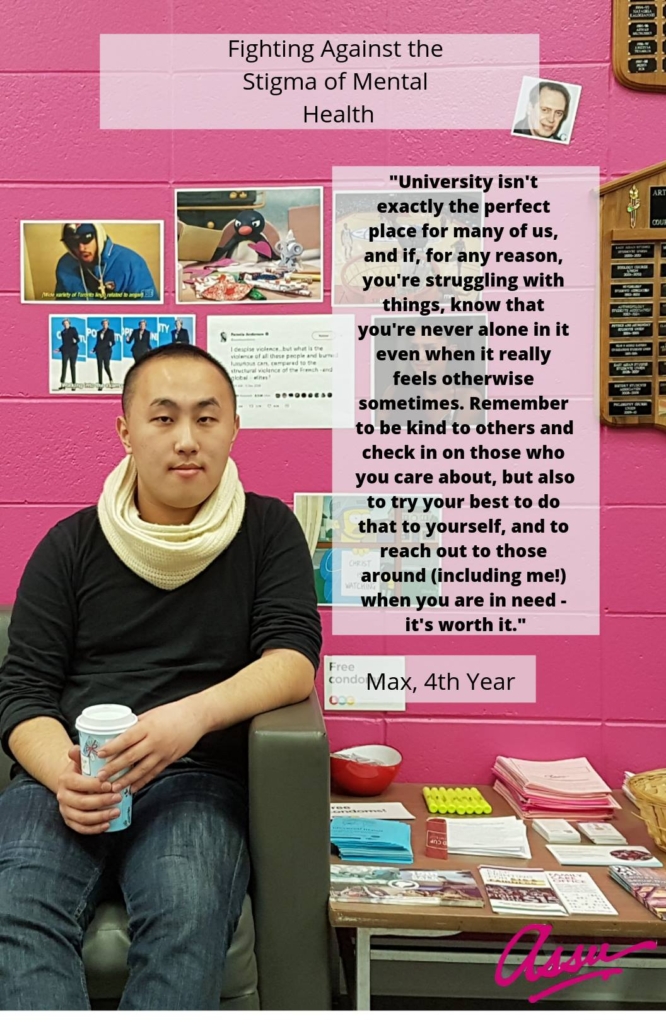Meet Max!
Max is a 4th year student currently doing a double major in Computer Science and Linguistics with a minor in Psychology. He enjoys doing the following: playing video games, reading, photography, and he especially likes making memes. Max is passionate about the things he does but he is sometimes a little disorganized, which is something he’s trying to work on. He barely watches movies or television, so he’s not really up to date when it comes to popular culture. He’s trying to diversify his hobbies and has been thinking of getting a button making machine.
Moving On From…
Max has a complicated history with his mental health. Max spent most of his life living with undiagnosed chronic mental health issues, while growing up in a cultural environment where discussion and awareness around mental health topics tend to be rare. Max struggled to understand why he dealt with constant mood issues and why it had always been difficult for him to finish assignments and exams on time. He also has a history with numerous (and sometimes inaccurate) diagnoses which also greatly confused him.
Max went to an international high school in Beijing, China, and came to U of T upon graduation, where he found himself pulled apart by two identities. Although Max spent almost his entire youth in China, he is a Canadian citizen. He finds it difficult navigating the healthcare system in Canada and struggles with cultural and language barriers that other domestic students seldom face. He doesn’t catch pop-culture references and local norms, making it even more difficult to fit in with his peers.
Transitioning from a small high school setting to an institute as large as U of T has been overwhelming at times. Where he was once surrounded by friends in every class and social events, Max came into university knowing no one. Max didn’t have a strong support network as he is distant from his parents and most of the friends he made during his early university years were commuters, which resulted in his days being spent in solitude. He has an especially hard time during breaks, as his friends go home but Max doesn’t have a home to go to. Without a daily routine to distract himself, he tends to play video game by himself during these holiday periods as a coping mechanism, which leaves him feeling extremely lonely.
In order to expand his social circle, Max joined the Language Exchange Initiative (LEI) club, where he eventually became an executive and in his 3rd year, he became an orientation leader, which he credits as being one of the best times he’s had at U of T. Max became involved with student politics when he successfully ran for the position of Woodsworth Director at the UTSU, which led to the beginning of his 3rd year looking up for him.
In November of 2017, Max submitted an assignment that he was proud of – however, he received a mark that devastated him, and being used to getting good grades and not having a good support system in place, Max was unable to cope with it and suffered a mental breakdown. He became depressed throughout the subsequent months and would spend many days crying in bed. He became unmotivated to do his school work, started having a hard time paying attention in class while often struggling with anxiety and panic attacks in the middle of lectures. This resulted in Max having to drop one of his courses and finishing with low marks in the courses he kept. He also started having a difficult time being part of many of the groups and social activities he was involved with and withdrew from many of them as a result.
Max hid his depressive state from his loved ones and friends as he didn’t want anyone to know that he was struggling, and it wasn’t until late January-early February of 2018 that he decided to seek professional help. The process was a long and difficult one, with him jumping between counselling and psychiatry where he often spent two to three months on waitlists and having to take himself to emergency rooms on occasions when his symptoms worsened. He received diagnoses on multiple mental disorders and learning disabilities, which helped him learn about the various factors that had shaped his academic performance and lifestyle.
Through a combination of counselling, medication, social support and personal recovery, Max is now in a better mental state and is attending class and social events once more. Although he still deals with difficulties, he now has a better understanding of what he’s experiencing. He registered with Accessibility Services, and now receives accommodations which is something he finds extremely helpful.
Max’s Take Home Message
“This is going to be a very difficult ride and not the linear university experience you’d expect. It’s going to be different but hold on to it as there will be positive moments. Even at the lowest points in your life when you may not think it’s possible, things may get better. Everything will probably be fine in the end” – to his past self
“University isn’t exactly the perfect place for many of us, and if, for any reason, you’re struggling with things, know that you’re never alone in it even when it really feels otherwise sometimes. Remember to be kind to others and check in on those you care about, but also try your best to do that for yourself, and to reach out to those around (including me!) when you are in need – it’s worth it.”- to the people reading this
If you or someone you know may be in distress or if you simply want someone to talk to, here are some helpful resources:
Health and Wellness-
UTSG- 416-978-8030
UTM- 905-828-5255
UTSC- 416-287-7065
Gerstein Centre Mental Health Crisis Line-
416-929-5200
Distress Centres (available 24/7/365)-
416-408-4357
OISE Psychology Clinic-
416-978-0620
Good 2 Talk Student Helpline-
1-866-925-5454
Anishnawbe Health Mental Health Crisis Line for Indigenous students-
416-891-8606
LGBTQ Youthline (peer support, open Sunday-Friday 4-9 pm)-
1-800-268-9688
Sexual Assault & Domestic Violence Care Centre-
416-323-6040

